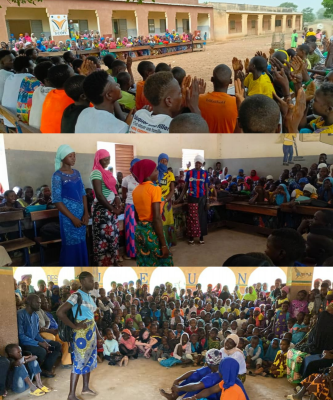Let's talk about Menstrual Hygiene Day

Photo credit: Terry Hughes
Update : May 2024
Raising awareness and starting a dialogue about menstruation
Menstruation is a normal biological process and a sign of reproductive health, yet in many countries, it's a taboo subject. In fact, in several parts of the world, menstruation is still perceived as something shameful and utterly private. Menstrual Hygiene Day, which falls on May 28, was created to recognize the right of people everywhere to hygienically manage their menstruation—and to get people talking about the challenges that women, girls, and others who menstruate face worldwide.
Easy access to safe water plays an important role in menstrual health
Lack of access to safe water and sanitation disproportionately affects women and girls. Furthermore, managing menstruation in a hygienic way is especially challenging since it requires adequate sanitation facilities. This negatively affects women’s health, safety and dignity, and prevent girls from attending school regularly and benefiting from equal educational opportunities. At One Drop, part of our commitment to providing sustainable access to safe water is ensuring that women and girls are at the forefront of positive change through their participation in social art activities.
Empowering women to improve the sustainability of water services
We believe in the importance of involving women and girls in the management of water and sanitation in order to challenge social norms. By amplifying women's voices and empowering them to make a difference, we are giving them a better chance at improving their reproductive health. We are also committed to providing schools with private latrines and separate facilities for boys and girls that are equipped with safe water, which creates an environment that is conducive to girls attending school. In addition, we believe in the importance of women’s groups and the participation of women in influential groups such as Water, Sanitation, and Hygiene (WASH) committees. This is crucial for raising awareness, creating dialogue, and engaging entire communities—including men, since they also have an important role to play in providing safe and hygienic environments for women.
Since 2020, the SCOFI Project has focused on boosting girls’ enrolment and addressing systemic hurdles to the long-term management of sanitary facilities in schools. Alongside its partners, the One Drop Foundation continues to roll out its Social Art for Behaviour Change™ (SABC) approach in schools across the Ségou Region, raising awareness around menstrual health and hygiene, challenging taboos, and tackling the behavioural determinants that beget harmful customs and norms. So far, 1,140 students have participated in training sessions on leadership and gender equality, alongside school headmasters, members of school management committees, village chiefs and mayors.

Working together toward the UN’s Sustainable Development Goals
As stated by the United Nations, without safe drinking water, adequate sanitation, and hygiene facilities at home and learning spaces, it is disproportionately harder for women and girls to lead safe, productive, and healthy lives. Achieving Sustainable Development Goal #6 - universal access to WASH - directly supports a number of targets related to better health, education, and gender equality.
This is why the needs of menstruating people cannot be ignored. At One Drop, we stand behind this wholeheartedly and are committed to improving the lives of women, girls, and others who experience a menstrual cycle by helping them to get access to safe water, hygiene, and sanitation.
Keep learning about our projects by subscribing to our newsletter!
Wish to help?
Donate here
